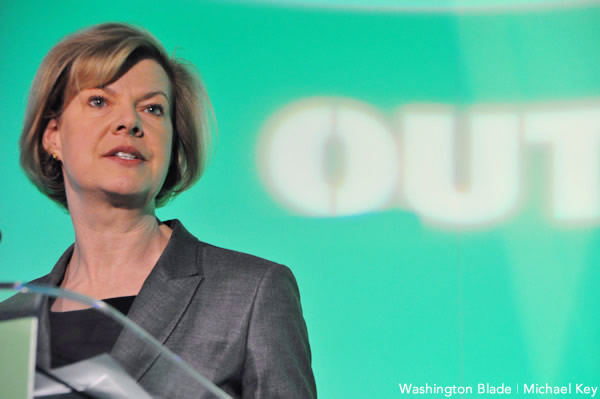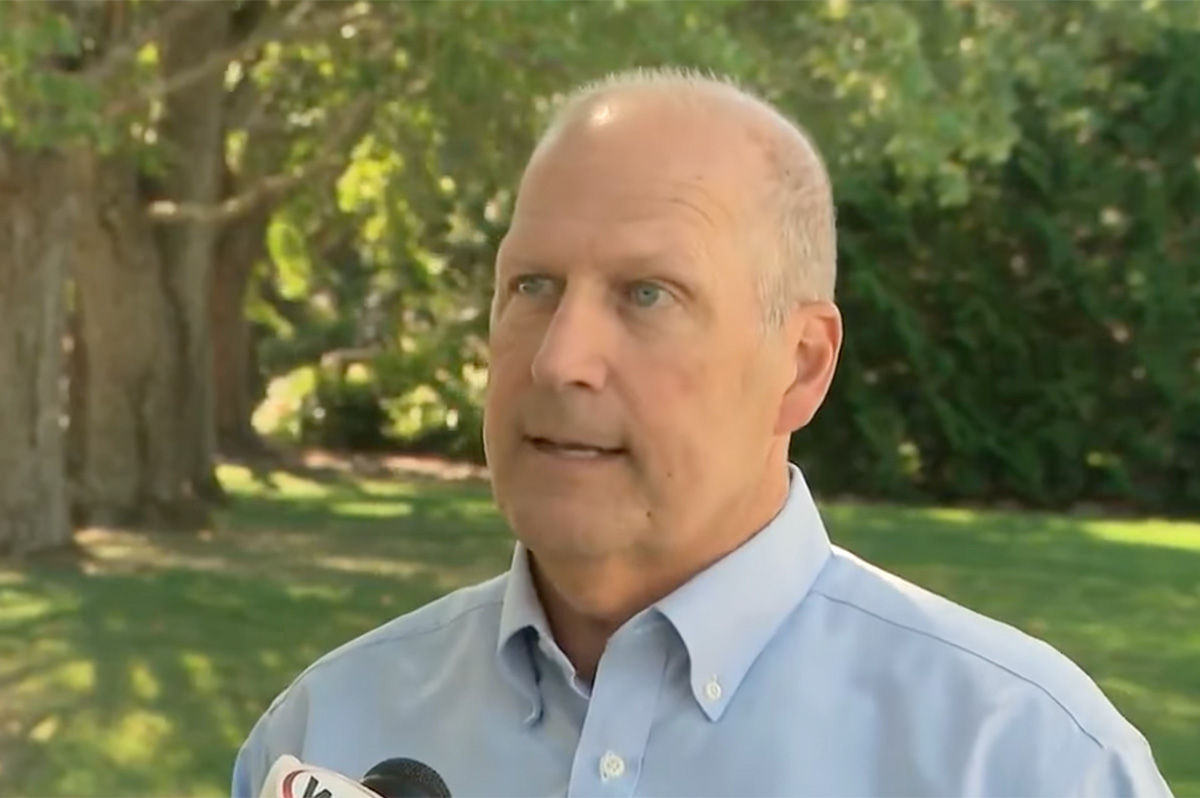Politics
Baldwin reflects on first 100 days as U.S. senator
Lesbian lawmaker sees movement on ENDA, anti-bullying measures


Sen. Tammy Baldwin (D-Wis.) will reach her 100th day in the U.S. Senate on Saturday. (Washington Blade photo by Michael Key)
The lesbian lawmaker who made history last year by becoming the first openly gay member of the U.S. Senate is about to mark another milestone: her first 100 days in office.
Saturday will mark 100 days in office for Tammy Baldwin, who was sworn in as the junior senator from Wisconsin on Jan. 3.
In an interview with the Washington Blade this week, Baldwin said nothing has surprised her since she took office in the Senate because the upper chamber of Congress is so obviously different from the House, where she served for 14 years.
“On the home front, the difference is between representing a whole state and representing a slice of that state that’s reconfigured every 10 years,” Baldwin said. “That’s a big difference, and I come from a big state, a state with a really interesting political history. And so, that’s really, really exciting for me personally to represent the whole state of Wisconsin.”
Another key change for Baldwin is the relative ease of getting to know her 99 colleagues in the Senate as opposed to the 434 members with whom she served in the larger House.
“It may be just catching up with people on the walk to the Capitol or an elevator ride — or all the people who’ve already reached out and said, ‘Let’s have dinner, let’s have coffee, let’s get to know each other and find out where our common ground is,” Baldwin said. “It’s one of the things I love about the legislative process — trying to build majority support for certain ideas. A lot of that is done on that person-to-person level. And it’s much tougher in the House.”
And Baldwin is undertaking outreach for the LGBT community as she completes her first 100 days in office. On April 18, the D.C.-based Whitman-Walker Health will honor the senator with its Partner for Life Award at the “Be the Care” event. On Sunday, Baldwin gave a well-received keynote speech at the Gay & Lesbian Victory Fund’s annual champagne brunch in D.C.
In terms of LGBT issues, the most prevalent topic in the U.S. Senate these days isn’t legislation, but senators coming out for marriage equality. Just this week, Sen. Tim Johnson (D-S.D.) added his name to the list of senators, making a total of 54 in support of marriage equality.
Baldwin said the trend of U.S. senators coming out in favor of marriage equality reflects a growing trend nationwide. A widely cited poll from the Washington Post found that 58 percent of the American public now backs marriage rights for gay couples.
“In many cases, just like the president’s evolution on the issue, it’s been because of individuals wanting their neighbors, their relatives, their friends who are part of the LGBT community to have full and equal rights, including the right to marry the person they love and protect their own families,” Baldwin said. “I think sometimes you see elected officials leading, sometimes you see elected officials following. As long as they get to the right place, I celebrate either way.”
While many of these senators talked about consideration of their gay friends and colleagues before making their announcements, Baldwin said no U.S. senator spoke to her for her perspective as a lesbian in the days before they made their announcements because they were in the middle of spring recess.
And Baldwin has little patience for members of the LGBT community who criticized Republican Sen. Rob Portman (Ohio) for endorsing marriage as a result of his son coming out as gay.
“Obviously, he had a choice between whether to change his mind and do so privately, or change his mind and do so publicly,” Baldwin said. “I think it took courage for him to make this announcement, and, frankly, as I said earlier, the major factor for most Americans changing their mind is because of someone they know, someone they love, someone they work with. And so this is how most Americans change their mind, and I think that’s a great thing. I’m certainly not going to criticize it, and I would ask again, for those who are critical of Sen. Portman and support marriage equality, we want people to get to that place and be ready to take that stance, and we don’t really care what their journey is. We just want them to get there.”
Baldwin sees movement on ENDA, anti-bullying measures
Baldwin has relatively optimistic views about Senate advancement of pro-LGBT bills in the remainder of the 113th Congress. She had particularly high hopes for legislation overseen by a panel on which she serves — the Senate Health, Education, Labor & Pensions Committee — foreseeing advancement of both the Employment Non-Discrimination Act and the Student Non-Discrimination Act.
Recalling that Senate HELP Committee Chair Tom Harkin (D-Iowa) has pledged to move the legislation to the floor this year, Baldwin said we’ll “very likely” see ENDA advance in the Senate.
Although Baldwin sees a path in the Senate for ENDA — even a floor vote — it ends there. She wasn’t optimistic that the House under Speaker John Boehner (R-Ohio) would be amicable to the legislation.
“I’m feeling optimistic that we can get a floor vote on ENDA,” Baldwin said. “I’m feeling fairly pessimistic about the chances of ENDA moving ahead in the House as currently composed.”
On the issue of bullying, Baldwin was optimistic that both chambers would approve legislation — provided the Senate undertakes education reform known as Elementary & Secondary Education Act reauthorization and includes the measure in the larger vehicle. Legislation that has addressed these issues are the Student Non-Discrimination Act and the Safe Schools Improvement Act.
“I think the prospect for either a Student Non-Discrimination Act within that bill or an anti-bullying measure within that bill — or even both — remains a distinct possibility,” Baldwin said. “And that is something that I think may be able to pass through both houses of Congress — especially given earlier action in the House on the Violence Against Women Act that had LGBT-inclusion. It suggests a willingness to act in similar ways to protect LGBT youth.”
Baldwin based on her distinction on the chances of passing ENDA and an anti-bullying inclusive education reform bill on the temperament of House Republican leadership — as well as passing the LGBT measure as one segment of another vehicle.
“I would say the parallel between VAWA and the ESEA is if we can make these very important provisions a part of a bill that gains some momentum, and that the Republicans in the House see as must-pass legislation, our prospects are brighter,” Baldwin said.
Although she predicts movement on ENDA, Baldwin also said she expects changes to ENDA upon reintroduction, which she anticipates later this month. The Blade previously reported the legislation was under review before its planned reintroduction later this month.
Baldwin didn’t detail the ways in which the legislation would be changed, but talked vaguely about changes to ENDA that are the result of lessons learned from states and municipalities that have enacted non-discrimination policies based on sexual orientation and gender identity.
“I certainly think there’ll be some changes based on the hard work of advocacy and legal defense organizations across the U.S. where lessons have been learned from state level legislation, and we want to capture some of those changes in the proposal that’s introduced in the Senate,” Baldwin said. “That said, there’s also always the counter-attention of trying to keep all the range of supportive organizations on board and all of the, not only all of the prior sponsors of the legislation, but obviously you want to build on that to gain momentum. So, I think that’s the — as I understand it — the process that’s ongoing right now, and we hope it’ll come to a conclusion shortly so that the bill can be introduced.”
As previously reported by the Blade, Baldwin confirmed two areas where ENDA is under reconsideration are the religious exemption, which was previously in line with Title VII of the Civil Rights Acts of 1964, and disparate impact, an issue previously unaddressed by ENDA that deals with discriminatory action by employers that isn’t discriminatory on its face.
Thoughts on immigration, court cases
Another piece of legislation of interest to the LGBT community is the immigration reform bill that the “Gang of Eight” in the U.S. Senate is expected to make public soon. The Blade reported earlier this week that the Uniting American Families Act — legislation that would enable gay Americans to sponsor their foreign same-sex partners for residency in the United States — is unlikely to be included as part of the agreement.
That’s an expectation shared by Baldwin. Still, she said she expects Sen. Patrick Leahy (D-Vt.), the sponsor of UAFA in the Senate, to attempt to amend any legislation that goes through the Senate Judiciary Committee with a provision to include gay couples.
“We have the very strong potential of having the Judiciary Committee look at the some of the areas where the ‘Gang of Eight’ on immigration have left silent,” Baldwin said. “I expect that the committee will do that. And I’m very hopeful about the odds of UAFA ultimately becoming a part of the immigration reform measure.”
While not a member of the Gang of Eight producing the initial immigration reform legislation, Baldwin said she has been speaking with members of the Judiciary Committee about including UAFA as they address the bill.
“I certainly keep in touch with members of the Senate Judiciary Committee and have been voicing my strong interest in seeing them take up UAFA as an amendment at that stage of consideration of the bill,” Baldwin said.
The legislative front isn’t the only place where LGBT advances are expected. The U.S. Supreme Court is expected to rule in June in two marriage equality-related lawsuits: one challenging California’s Proposition 8, the other challenging the Defense of Marriage Act.
Baldwin, who attended oral arguments in the DOMA case, said she’s hopeful about an outcome that would enable the federal government to recognize legally married same-sex couples.
“I’m very hopeful that there will be a determination that DOMA is unconstitutional,” Baldwin said. “My hope is that then marriages would be recognized by the federal government regardless of venue or jurisdiction, but that really is one of the key issues that people are watching, and again, we don’t know how broadly the court will apply its decision.”
Although she wasn’t in attendance for the Prop 8 arguments, Baldwin was hopeful about a positive court ruling, although she didn’t know what the scope of the ruling would ultimately be.
“The feeling that the court may basically rule it’s improperly before the Supreme Court at this time either because of standing issues or because they basically made a premature decision to take up the case,” Baldwin said. “In either event, my understanding is that the lower court ruling, which declared Proposition 8 unconstitutional, would stand, but, unfortunately, that would mean the reach was only to the State of California, not nationally.”

Former Vice President Dick Cheney died of complications from pneumonia and cardio and vascular disease, according to a family statement released Tuesday morning. He was 84.
Cheney served as vice president under President George W. Bush for eight years and previously as defense secretary under President George H.W. Bush. He also served as a House member from Wyoming and as White House chief of staff for President Gerald Ford.
“Dick Cheney was a great and good man who taught his children and grandchildren to love our country, and to live lives of courage, honor, love, kindness, and fly fishing,” his family said in a statement. “We are grateful beyond measure for all Dick Cheney did for our country. And we are blessed beyond measure to have loved and been loved by this noble giant of a man.”
Cheney had a complicated history on LGBTQ issues; he and wife Lynne had two daughters, Liz Cheney and Mary Cheney, who’s a lesbian. Mary Cheney was criticized by LGBTQ advocates for not joining the fight against President George W. Bush’s push for a constitutional amendment banning gay marriage. She later resumed support for LGBTQ issues in 2009, including same-sex marriage, after her father left office in 2009. She married her partner since 1992, Heather Poe, in 2012.
In 2010, after leaving office, Cheney predicted “Don’t Ask, Don’t Tell” would “be changed” and expressed support for reconsideration of the law banning open military service.
In 2013, the Cheney family’s disagreements over marriage equality spilled into the public eye after Liz Cheney announced her opposition to same-sex couples legally marrying. Mary Cheney took to Facebook to rebuke her sister: “Liz – this isn’t just an issue on which we disagree – you’re just wrong – and on the wrong side of history.” Dick and Lynne Cheney were supporters of marriage equality by 2013. Liz Cheney eventually came around years later.
Cheney, a neo-con, was often criticized for his handling of the Iraq war. He was considered one of the most powerful and domineering vice presidents of the modern era. He disappeared from public life for years but re-emerged to help Liz Cheney in her House re-election bid after she clashed with President Trump. Dick Cheney assailed Trump in a campaign video and later Liz announced that her father would vote for Kamala Harris in the 2024 presidential election.
New Hampshire
John E. Sununu to run for NH Senate seat
Gay Congressman Chris Pappas among other candidates

Former U.S. Sen. John E. Sununu on Wednesday announced he is running for retiring U.S. Sen. Jeanne Shaheen (D-N.H.)’s seat in 2026.
“Washington, as anyone who observes can see, is a little dysfunctional right now,” Sununu told WMUR in an interview the New Hampshire television station aired on Wednesday. “There’s yelling, there’s inactivity. We’ve got a government shutdown. Friends, family, they always say, ‘Why would anyone want to work there?’ And the short answer is it’s important to New Hampshire. It’s important that we have someone who knows how to get things done.”
Sununu, 61, was in the U.S. House of Representatives from 1997-2003 and in the U.S. Senate from 2003-2009. Shaheen in 2008 defeated Sununu when he ran for re-election.
Sununu’s father is John Sununu, who was former President George H.W. Bush’s chief of staff. Sununu’s brother is former New Hampshire Gov. Chris Sununu.
John E. Sununu will square off against former U.S. Sen. Scott Brown in the Republican primary. Gay U.S. Rep. Chris Pappas (D-N.H.) is among the Democrats running for Shaheen’s seat.
“As a small business owner and public servant, I’m in this fight to put people first and do what’s right for New Hampshire,” said Pappas on Wednesday on X. “I’m working to lower costs and build a fair economy. Washington should work for you — not corporate interests.”
Politics
Homophobia, racism, and Nazis: The dark side of rising Republican leaders
Leaked messages from young GOP leaders reveal normalized extremist rhetoric and internal party divisions.

The Young Republican National Federation (YRNF) — an organization dedicated to politically organizing young conservatives and helping them win elected office across the United States — is under fire after thousands of homophobic, sexist, racist, anti-Semitic, and violent Telegram messages from state-level group chats were leaked.
Politico reviewed nearly 2,900 pages of messages exchanged between January and August 2025 by members of state chapters of the YRNF, the youth wing of the Republican Party. Many of those involved in the chats currently hold or have held positions in state governments across New York, Kansas, Arizona, and Vermont.
Participants in the chats used racist, ableist, and homophobic slurs 251 times, according to Politico’s analysis. “Faggots,” “monkeys,” “watermelon people,” and “retards” were just some of the reported language used.
Within the leaked messages, at least six instances of explicitly homophobic language came from some of the youngest leaders in the Republican Party. Much of this rhetoric targeted Hayden Padgett, who recently won election as national chair of the Young Republicans. Padgett’s victory came after a bitter contest with Peter Giunta, the former chair of the New York State Young Republicans, who led an “insurgent” faction within the group and has been quoted most frequently in coverage of the leak.
Giunta, who was found to repeatedly say how much he “loved” Hitler in the group chat and used the N-word multiple times, was reportedly angry over losing the August election. He wrote messages such as “Minnesota – faggots,” referring to the state’s Young Republican organization, and “So you mean Hayden faggot wrote the resolution himself?”
Luke Mosiman, chair of the Arizona Young Republicans, responded with “RAPE HAYDEN” — later joking about Spanish colonizers coming to America and having “sex with every single woman.” Alex Dwyer, chair of the Kansas Young Republicans, replied, “Sex is gay.” Mosiman followed with, “Sex? It was rape.”
Bobby Walker, former vice chair of the New York State Young Republicans and former communications director for New York state Sen. Peter Oberacker, made at least two homophobic comments, including “Stay in the closet faggot,” and, in another message mocking Padgett, “Adolf Padgette is in the faggotbunker as we speak.”
William Hendrix, vice chair of the Kansas Young Republicans and former communications assistant for Kansas Attorney General Kris Kobach, was also a frequent participant, posting numerous racist and homophobic remarks — including, “Missouri doesn’t like fags.”
Joe Maligno, who served as general counsel for the New York State Young Republicans, said, “Can we fix the showers? Gas chambers don’t fit the Hitler aesthetic.”
There were multiple anti-Semitic dog whistles used, most notably Dwyer’s use of “1488” in the chat. The “14” references the 14 words in the white supremacist slogan, “We must secure the existence of our people and a future for white children,” while “88” is shorthand for “Heil Hitler,” with “H” being the eighth letter in the alphabet.
In response to the controversy Vice President J.D. Vance downplayed the leak, calling it an example of “kids doing stupid things” and “telling edgy, offensive jokes.”
Everyone mentioned in the group chat is over the age of 20. Peter Giunta is 31 years old, and Joe Maligno is 35. The ages of the other participants were not specified, but most accounts indicate they are over 24.
This leak exposes how some up-and-coming Republican leaders have normalized offensive and extreme rhetoric, reflecting both the erosion of political and cultural sensitivity and the influence of Trump and his allies. It also underscores the widening divide within the party between its traditional conservative wing and a far-right faction emboldened by such rhetoric.
-

 District of Columbia1 day ago
District of Columbia1 day ago‘Sandwich guy’ not guilty in assault case
-

 Sports1 day ago
Sports1 day agoGay speedskater racing toward a more inclusive future in sports
-

 Celebrity News3 days ago
Celebrity News3 days agoJonathan Bailey is People’s first openly gay ‘Sexiest Man Alive’
-

 Opinions4 days ago
Opinions4 days agoNew York City mayoral race gets nasty but Mamdani will win



















